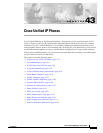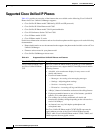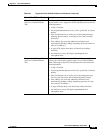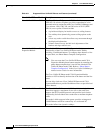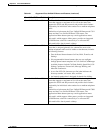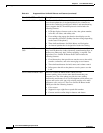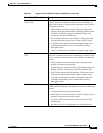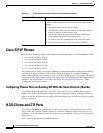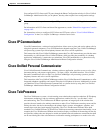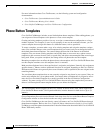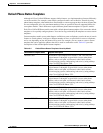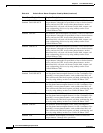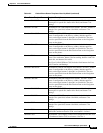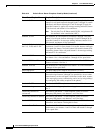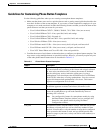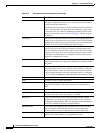
43-8
Cisco Unified CallManager System Guide
OL-14153-01
Chapter 43 Cisco Unified IP Phones
Cisco SIP IP Phones
Cisco SIP IP Phones
Cisco Unified CallManager supports the SIP protocol on the following Cisco Unified IP Phone models:
• Cisco Unified IP Phone 7970/71
• Cisco Unified IP Phone 7960/61
• Cisco Unified IP Phone 7940/41
• Cisco Unified IP Phone 7911/06
• Cisco Unified IP Phone 7905/12
The administrator uses the Cisco Unified CallManager Administration Phone Configuration window to
configure an IP phone for SCCP or SIP. If SIP is chosen, additional Cisco Unified CallManager
Administration configuration windows get used to configure the SIP protocol; for example, SIP Profile
Configuration. See Table 43-6 for configuration requirements. For information on SIP Profiles and SIP
Dial Rules, see SIP Dial Rules Configuration and SIP Profile Configuration in the Cisco Unified
CallManager Administration Guide.
Configuring Phones That are Running SIP With the Same Directory Number
Cisco Unified IP Phones 7906, 7911, 7941, 7961, 7970, and 7971 that are running SIP can support
multiple lines with the same directory number in different partitions; however, configuring and using
other Cisco Unified IP Phones that are running SIP with multiple lines with the same directory number
do not get supported.
H.323 Clients and CTI Ports
Cisco Unified CallManager Administration enables you to configure software-based devices such as
H.323 clients and CTI ports. Software-based Cisco Unified CallManager applications such as Cisco
SoftPhone, Cisco AutoAttendant, and Cisco IP Interactive Voice Response (IVR) use CTI ports that are
virtual devices.
H.323 clients include Microsoft NetMeeting devices.
Cisco IP Phone 30 VIP The Cisco IP Phone model 30 VIP offers many of the same features
as PBX or POTS telephones. This IP phone includes the following
features:
• 26 programmable line and feature buttons
• An LED that is associated with each of the 26 feature and line
buttons to indicate feature and line status
• A two-line LCD for displaying date and time, calling party
name, calling party number, and digits dialed
• An internal, two-way speakerphone with microphone mute
• Dedicated feature buttons for Transfer, Hold, and Redial
Table 43-1 Supported Cisco Unified IP Phones and Features (continued)
Cisco Unified IP Phone Model Description



